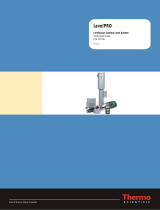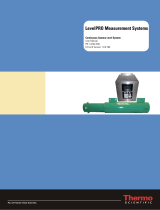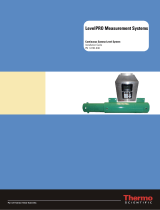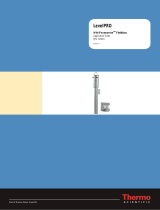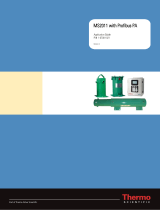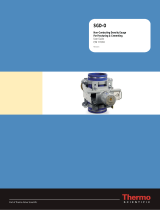Page is loading ...

Part of Thermo Fisher Scientific
LevelPRO
With HART® Protocol
Interface Operation Guide
P/N 717817
Revision C


LevelPRO
With HART® Protocol
Interface Operation Guide
P/N 717817
Revision C


© 2011 Thermo Fisher Scientific Inc. All rights reserved.
“Microsoft” and “Windows” are either trademarks or registered trademarks of Microsoft Corporation in the
United States and/or other countries.
“HART” is a registered trademark of the HART Communication Foundation.
“Motorola” is a registered trademark of Motorola, Inc.
All other trademarks are the property of Thermo Fisher Scientific Inc. and its subsidiaries.
Thermo Fisher Scientific Inc. (Thermo Fisher) makes every effort to ensure the accuracy and completeness of this
manual. However, we cannot be responsible for errors, omissions, or any loss of data as the result of errors or
omissions. Thermo Fisher reserves the right to make changes to the manual or improvements to the product at
any time without notice.
The material in this manual is proprietary and cannot be reproduced in any form without expressed written
consent from Thermo Fisher.

This page intentionally left blank.

Thermo Fisher Scientific LevelPRO HART Operation Guide v
Revision History
Revision Level Date Comments
1.0 05-2001 Initial release.
A 03-2006 Per ECO 5119.
B 10-2007 Per ECO 6000.
C 02-2011 Per ECO 7649.

This page intentionally left blank.

Thermo Fisher Scientific LevelPRO HART Operation Guide vii
Contents
Chapter 1 Overview............................................................................................................. 1-1
Introduction........................................................................................ 1-1
Terms.................................................................................................. 1-1
Theory of Operation ........................................................................... 1-2
HART Board ................................................................................... 1-2
LevelPRO DD ................................................................................. 1-2
Gauge .............................................................................................. 1-2
Contact Information ........................................................................... 1-3
Instrument Setup with HART .......................................................................... 2-1
Chapter 2
Chapter 3 HART Multi-Drop Mode ................................................................................... 3-1
HART Unique ID .............................................................................. 3-1
HART Polling Address ....................................................................... 3-1
Exit Multi-Drop.................................................................................. 3-1
Limitations in Multi-Drop Mode........................................................ 3-2
Certifications ..................................................................................................... 4-1
Chapter 4
Appendix A LevelPRO DD Flowcharts ............................................................................... A-1

This page intentionally left blank.

Chapter 1
Overview
Introduction troduction This manual describes the setup and operation of the optional HART
interface for the Thermo Scientific LevelPRO continuous gamma level
system. This interface includes:
● HART interface, which consists of a Motorola 68HC12 P and
interface circuitry to both the instrument and the HART bus. This
board mounts to the gauge housing and attaches to the CPU board
with a ribbon cable.
● LevelPRO HART Device Description (DD), which offers access to the
instrument’s measurement data and basic setup functions. This DD is
typically loaded into the 275 / 375 (or later) Field Communicator from
Emerson Electric Co.
Note It is assumed that readers have a basic familiarity with the gauge. If
necessary, refer to the LevelPRO user guide (p/n 717778). ▲
Terms Terms The following terms are used in this document:
● HART: An acronym for Highway Addressable Remote Transducer.
The protocol is maintained by the HART Communication
Foundation.
● Device Description (DD): A program script that contains the
menus/methods for interacting with a HART instrument. The 275 /
375 (or later) Field Communicator has a built-in interpreter to run DD
scripts. The LevelPRO DD is referred to as LevelPRO DD.
● HART board: The LevelPRO HART interface.
● 275 / 375 / later: The 275 / 375 (or later) Field Communicator from
Emerson Electric Co.
Thermo Fisher Scientific LevelPRO HART Operation Guide 1-1

Overview
Theory of Operation
Theory of
Operation
HART Board
The HART board serves as an intelligent pass-through between the
“external” HART world and the gauge. It has three responsibilities:
● Maintain a local copy of all gauge setup data for fast retrieval.
● Offer real-time access to the gauge’s process and alarm data.
● Translate incoming HART requests to the equivalent native gauge
requests, collect the data, and send the response to the HART
requestor.
On the gauge side, the HART board co-opts the gauge’s RS232 port and
talks to it in logic levels in the usual ASYNC format. On the HART side,
the HART telemetry is “mixed” with the gauge’s 4–20 mA current out.
The HART master (usually the 275/375/later field communicator) talks to
the gauge over its current loop.
LevelPRO DD The LevelPRO DD is designed to offer access to the gauge’s process data
and basic setup functions, including:
● Primary measurement setup
● Process alarms
● Additional measurements
● Current output settings
● Gauge fine tuning
● Action items (gauge restart, erase memory)
As practical, the DD menu structure mirrors that found in the gauge. The
DD menu flowcharts appear in Appendix A.
Gauge Once the HART board is installed, the gauge enters a special mode of
operation by:
● Overriding all user RS232 selections and setting the port to 96007E1,
Blind Mode, data streaming inhibited.
● Disabling all RS232 setup menus in the gauge user system.
● Enabling HART board software watchdog, which monitors HART
board data requests. The watchdog will raise a system fault alarm if
there were no requests received in a one-minute interval.
1-2 LevelPRO HART Operation Guide Thermo Fisher Scientific

Overview
Contact Information
Thermo Fisher Scientific LevelPRO HART Operation Guide 1-3
If you have questions or require additional technical support, contact
Thermo Fisher.
Contact
Information
Process Instruments
1410 Gillingham Lane
Sugar Land, TX
77478 USA
+1 (800) 437-7979
+1 (713) 272-0404 direct
+1 (713) 4573 fax
14 Gormley Industrial Avenue
Gormley, Ontario
L0H 1G0
CANADA
+1 (905) 888-8808
+1 (905) 888-8828 fax
Unit 702-715, 7/F Tower West
Yonghe Plaza No. 28
Andingmen East Street, Beijing
100007 CHINA
+86 (10) 8419-3588
+86 (10) 8419-3580 fax
A-101, 1CC Trade Tower
Senapati Bapat Road
Pune 411 016
Maharashtra, INDIA
+91 (20) 6626 7000
+91 (20) 6626 7001 fax
Ion Path, Road Three
Winsford, Cheshire
CW7 3GA
UNITED KINGDOM
+44 (0) 1606 548700
+44 (0) 1606 548711 fax
www.thermoscientific.com

This page intentionally left blank.

This page intentionally left blank.

Chapter 3
HART Multi-Drop Mode
The LevelPRO HART supports the HART multi-drop mode where up to
15 slaves can be interconnected on a single current loop. While in this
mode, the gauge parks its current out at 3.8 mA. Each slave must be
assigned an individual unique ID and polling address to be accessed by a
HART Master.
HART Unique ID The unique ID is a 24-bit number that the HART protocol uses to
distinguish between slaves in the long-addressing format. The gauge stores
this ID in non-volatile (NV) RAM. It is shipped with an ID of 0. At
power-up, the HART board reads this ID from the gauge.
The ID may be set via the gauge’s built-in user interface, with the Thermo
Scientific 9734 RS485 handheld. To set a unique ID using direct entry:
1. Enable the protected NV section (0050101).
2. Assign a non-zero HART unique ID (019015 SN, where SN is a 24-bit
hexadecimal number from 1 to 0xFFFFFF).
HART Polling
Address
The polling address is an 8-bit number (0–15), which is used to distinguish
between slaves in the short-addressing format. The polling address resides
in the HART board’s NVRAM. The FR275/375/later is typically used to
assign the polling address (refer to the FR275/375/later user guide). Once
the polling address is assigned, the gauge parks its current out at 3.8 mA.
Exit Multi-Drop Exit multi-drop mode by restoring the gauge’s polling address to zero.
Afterward, the current out operation returns to normal.
Thermo Fisher Scientific LevelPRO HART Operation Guide 3-1

HART Multi-Drop Mode
Limitations in Multi-Drop Mode
3-2 LevelPRO HART Operation Guide Thermo Fisher Scientific
Limitations in
Multi-Drop Mode
While in multi-drop mode, the gauge current output will not:
● Track the measurement (PV)
● Perform user current hold commands
● Perform current out alarm actions (go to Fault Low/Fault High)

Chapter 4
Certifications
The LevelPRO HART conforms to the HART Physical Layer Specification
Rev. 5.0.
Thermo Fisher Scientific LevelPRO HART Operation Guide 4-1

This page intentionally left blank.
/

